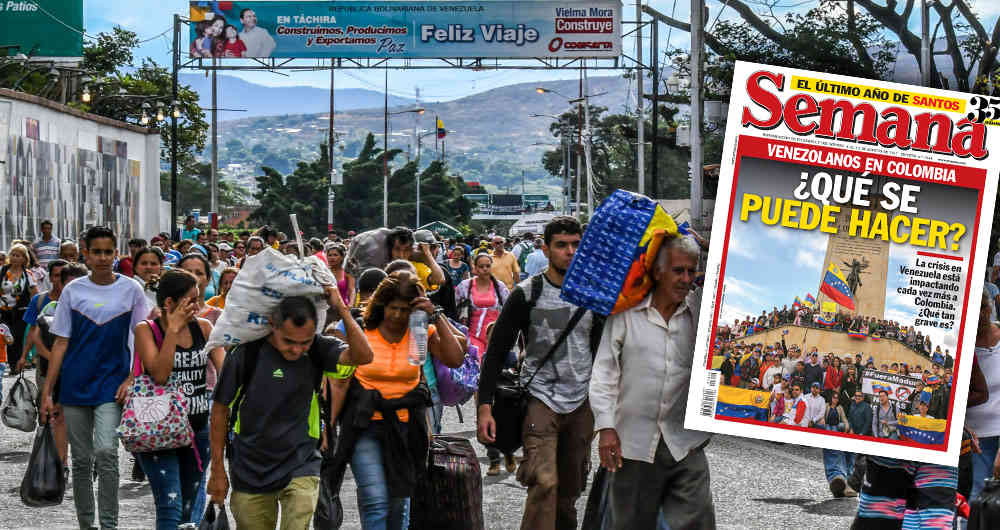
(Insightcrime.org) Venezuelans fleeing the nation’s political and economic crisis are boosting both criminal profits and the sources of cheap labor for organized crime across the region.
With an average of 25,000 Venezuelans crossing over into Colombia daily via six official border points, countless more will be making their way across via the dozens of clandestine crossings up and down the border, and paying taxes to the National Liberation Army (Ejército de Liberación Nacional – ELN), BACRIM groups such as the Urabeños and corrupt elements of the armed forces to do so. Informal activities continue to make up for nearly 70 percent of the economy of the Cúcuta border town, the highest rate in the country, reported Semana.
The migration of Venezuelans to Colombia has historically been quite low, but in recent years has increased by 40 percent due to the volatile political climate, insecurity and dire economic conditions. Asylum requests by Venezuelans in Colombia have increased six-fold since last year, and there are currently 140,000 undocumented Venezuelans living in the country, according to Colombia’s national immigration service, and that number is growing.
With their economy in freefall, acute shortages and hyperinflation, many Venezuelans are turning to whichever sources of income they can find. The number of Venezuelans arrested in Cúcuta, Colombia for drug-related crimes jumped by 227 percent during the first half of 2017 compared to the same period in 2016, and those for mugging by 219 percent. A recent investigation by The Economist reported that there may be as many as 4,500 Venezuelans sex workers in Colombia.
The dire need of Venezuelan migrants provides a business opportunity for Colombian organized crime to recruit cheap workers, and the volume of people coming over the border as well as its length makes it impossible for authorities to efficiently crack down on illegal activity.
Venezuelan migrants are also having an impact in the Dominican Republic, where they are increasingly working as drug mules, according to a recent field investigation by InSight Crime.
“It has broken all records,” Verny Troncoso, the Santo Domingo province’s lead prosecutor for drug-related cases told InSight Crime.
An average of three to four Venezuelan mules have been caught per week flying into the island’s capital since October 2016, and Venezuelans now make up for 90 percent of all mules caught by Dominican authorities, Troncoso said. Human trafficking sex rings have also increasingly exploited Venezuelan migrants, prompting Dominican police and Interior Minister Carlos Amarante Baret to highlight the problem in November last year.
Venezuela’s economic and security crisis is fuelling criminality not only at home, but around the region.
Reports of hungry citizens turning to piracy or drug trafficking have emerged, while the chaos in the country has allowed for domestic criminal groups to operate with impunity and little interference from a divided government increasingly focused on its own political survival. Foreign criminal organizations are profiting from Venezuela’s crisis — in particular Colombian groups. Reports, for instance, have pointed to the Rastrojos criminal group taking advantage of the situation to consolidate its operations in Venezuela and along the border, and the country has long been a safe haven for Colombia’s rebel armies.
Reports that migrant Venezuelans are now being employed or victimized by criminal organizations adds another layer to the criminal impact of the Venezuelan crisis. In December last year, Dominican authorities implemented measures regulating the flow of Venezuelans who can still enter the island without a visa.
But Colombia’s underworld may benefit the most from Venezuelan migration and desperation. Since the demobilization of the Revolutionary Armed Forces of Colombia (Fuerzas Armadas Revolucionarias de Colombia – FARC), large criminal economies have been left up for grabs, prompting confrontations between rival rebel groups and BACRIM. As these groups strengthen their presence and ranks on both sides of the shared border with Venezuela, new and willing recruits prepared to work for peanuts will be welcomed.
Source: Insightcrime.org













